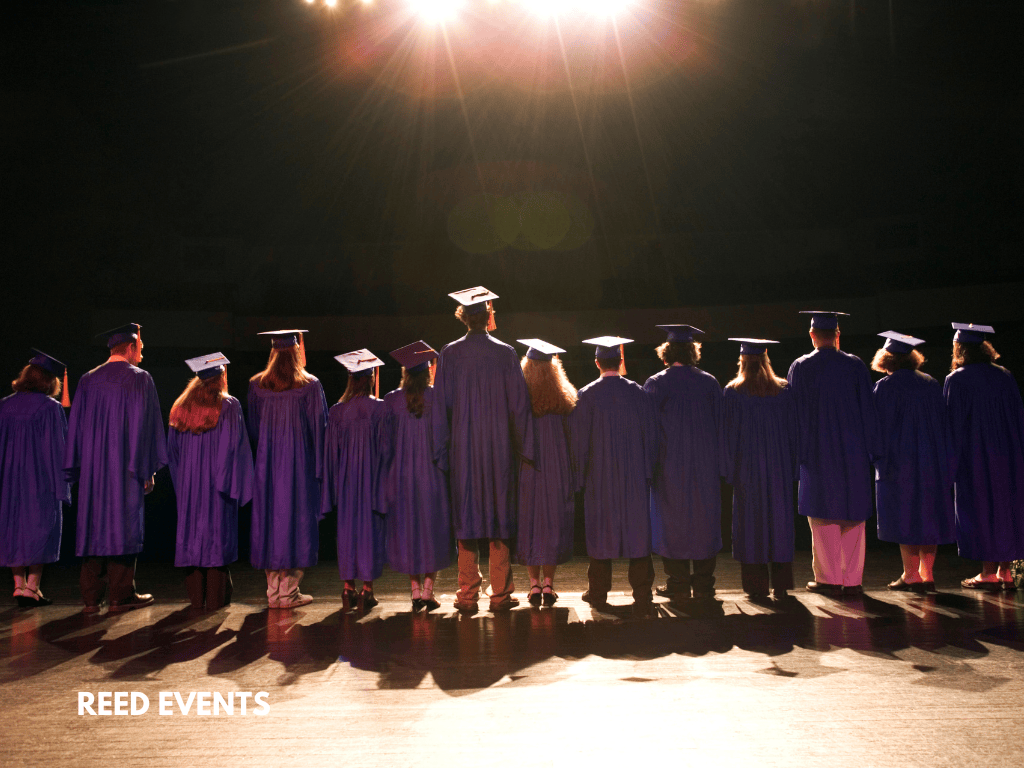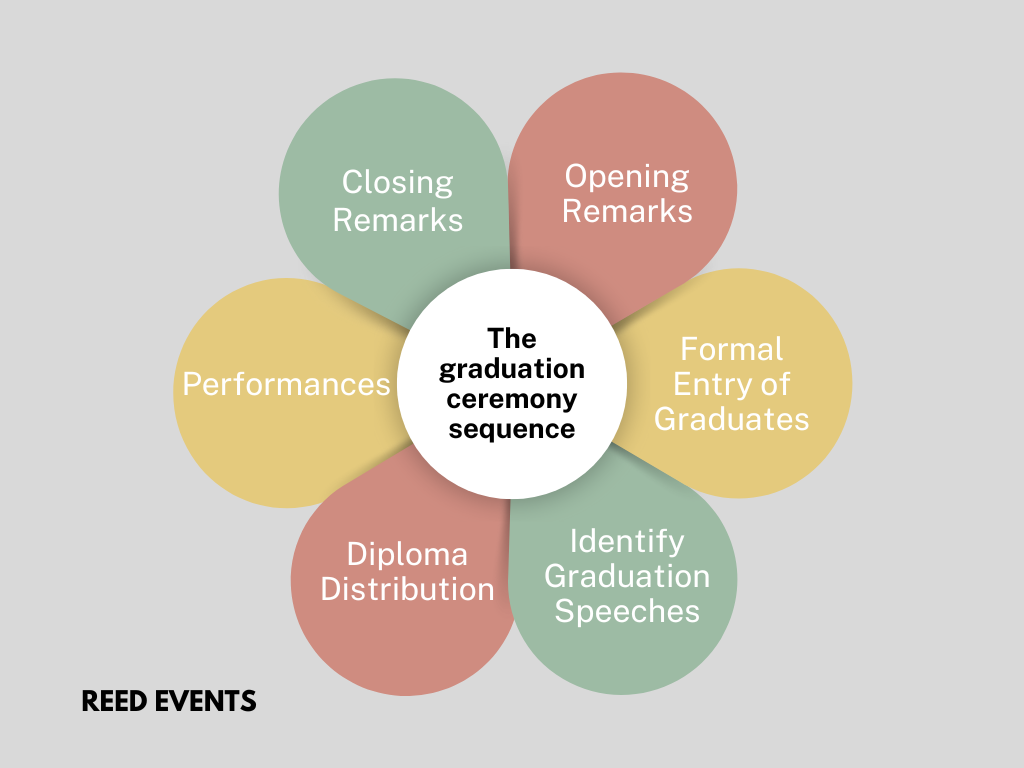How to Prepare for the Graduation Ceremony Planning

A thorough graduation planning is a must to ensure a well-executed college graduation ceremony.
Imagine a school that underestimates the necessity of preparation, assuming everything will fall into place. But on the day of the event, if proper preparation has not been taken, there are high chances of problems such as sound system failures or long delays in seating guests.
On the other hand, imagine planning a graduation ceremony where the planning team has already organised several walkthroughs, rehearsals, and meetings with the technical staff prior to the program. This will definitely ensure that the event goes off without a hitch. The sound, light, and visuals will work fine, while all the attendees and guests can enjoy the momentous occasion fully.
So, with that in mind, in this step-by-step manual, we have created a list of essential steps covering everything from budgeting to venue selection to logistics.
1. Set your budget
It is the first and most crucial step in planning a graduation ceremony, as it forms the foundation upon which all the other decisions are made. The budget is what influences every other stage of the event, from the choice of the venue to the selection of entertainment. You can begin by listing all potential expenses, including venue rental, regalia, photography, videography, and decorations.
Then, research the average costs in each area to prioritise your spending. It is always a wiser idea to add a contingency fund to cover unexpected costs. So, with a clear budget in place, you can decide where to spend and where to save.
Questions you can consider when setting a budget.
- What are the must-have elements for the ceremony?
- What is the cost of a venue that fits your event size?
- How much do similar ceremonies typically spend?
- What unexpected cost could arise?
- Is there any potential cost-saving alternative?
- Finally, do you need any fundraising ideas for raising funds?
2. Set the time and location

Explore the availability of your preferred venues and find out whether the venue is available on your desired date. You might need to consider alternate dates if it is not available. When selecting the venue, estimate the number of approximate people who are attending. Also, prioritise the convenience of the location like travel distance, parking availability and ease of access.
Timing of the event hold an important place as well. You have to consider the typical schedules of your graduates, their parents and faculty members. If you are going for an outdoor ceremony, you have to consider weather. And once you sort out these factors, you can finalise the date and location as early as possible.
3. Create a planning committee
A planning committee works as the backbone of a well-organised graduation ceremony. Identify the key roles of everyone involved, including logistics coordinators, vendor managers, event coordinators and decorations planners. When the team is assembled, define what each person is responsible for and set deadlines and expectations for each task.
Set regular meetings to keep each of them on the same page and encourage open communications. Maintain a collaborative approach to handle potential challenges. You must ensure that no issue is overlooked during the planning process.
4. Choose a theme
Go for a well-thought-out theme that will not only just boost the visual appeal of the ceremony but also reflect the achievements of the graduating class. It will set the tone for the event while creating a sense of harmony and purpose.
For example, if you set the theme based on the colour of your institution's logo, such as blue and white and design everything from the banners to the graduation programs in the coordinating hues, it will look more organised and elegant.
Make sure the theme is appropriate for all ages and backgrounds and the venue has enough space and infrastructure to support it.
5. Take order for regalia

Graduation regalia such as caps, gowns and tassels are essential symbols of academic achievement. So you must begin the regalia ordering process well in advance of the graduation date to avoid any potential issues such as size mismatch, shipping delays or colour issues.
One important thing is that you must coordinate with a reliable supplier that comes with a proven track record of providing high-quality regalia on time. Consider using services that offer a comprehensive range of graduation regalia alongside other professional support. Once the regalia orders have been received, organise the distribution process carefully.
6. Send invitations
Begin by making a comprehensive guest list including the graduates, their families, faculty members, administrative staff and other special guests and speakers. When designing the invitation make sure it reflects the theme and tone of the graduation ceremony.
Suppose, if it a formal event, add traditional elements such as gold foil or embossed details. But if it is a casual and themed event, opt for playful colours and modern designs.
7. Coordinate with vendors and service providers
Vendors and graduation service providers handle everything from catering to photography to audio-visual equipment to transportation to floral arrangements. Hence, effective coordination is a must to ensure that everything runs smoothly on the day of the event.
Work on the coordination as early as possible. Make sure they are available on the date of your graduation ceremony. You can even ask them to provide references and examples of their past work. Ask your vendors about the customisation options, contracts and logistics in detail.
Once you have selected your vendors, outline every detail in the contract, including all details such as payment terms, costs, date and time of the event, and additional charges. Maintain regular communication to ensure everything goes according to plan.
8. Design the ceremony program
You have to decide the flow of the ceremony by deciding the sequence and timing of the programs. For example, you can keep the sequence in the following way- opening remarks, formal entry of graduates, graduation speeches, diploma distribution, performances and closing remarks.

Coordinate with speakers, performers and other participants and give them a detailed brief outlining their role. When considering the speakers, decide who will speak, the order of speeches as well as the duration. You have to monitor the timing of each segment to avoid overruns.
9. Arrange for photography and videography
At a graduation ceremony, high-quality photos and videos are used to preserve the memories of graduates, their families, and the institution. So, before the event starts, you have to define your needs by determining the moments you want to capture. Keep individual graduate photos, guest interactions, and ceremony highlights on the list.
Consider live streaming alongside full-length recordings of the ceremony. Look for vendors and services that offer bundled packages that include both photography and videography. Make a detailed short list outlining must-have moments such as cap toss or valedictorian speech.
10. Conduct a full rehearsal
A full rehearsal is mandatory to ensure that everyone involved knows their roles. When scheduling the rehearsal, pick a date close to the ceremony that will be convenient for all key participants, such as graduates, faculty and staff, speakers and performers, vendors and technical staff.
Go through each segment of the ceremony in order to review the program. Ask your speakers to practice their speeches and make sure the audio setup is clear and effective. Let your graduates practice their walk on stage, how they will receive their diplomas and pose for photos. Also, practice the entrance and exit sequence with everyone involved.
Conclusion
Planning for a graduation ceremony may seem overwhelming at first glance but breaking it down into steps make it sound more manageable. From setting up a planning team to organising the details like the venue, budget, and schedule, each step helps ensure the day goes off smoothly.
Hence, prepare carefully so that during the event, you can relax and enjoy a day celebrating your hard-working graduates taking no hassle.







